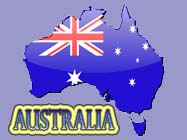Australia flags big rise in immigrant numbers
 Sydney - Australia's immigrant intake has doubled in 10 years and could double again as the booming economy generates jobs for the skilled and unskilled alike.
Sydney - Australia's immigrant intake has doubled in 10 years and could double again as the booming economy generates jobs for the skilled and unskilled alike.
"Increasingly what we're seeing is a labour shortage that we're not going to be able to meet from inside Australia," Immigration Minister Chris Evans said Saturday.
"We've got to decide how we want to respond to that - whether we want to bring in short term, unskilled labour, and if so, under what conditions we bring them in."
Last week the government announced that the quota for next year would be 300,000 - the biggest increase in immigration since the post-World War II influx in 1947.
Evans said Australia had dropped its longstanding opposition to a guest worker scheme and would soon invite farm workers from the South Pacific to apply for visas that would let them in for harvest time.
"The largest movement of people in the country's history is under way," Monash University researcher Andrew Markus said.
He estimated a quarter of the 21 million Australians were born abroad - twice the proportion of the population in the United States and three times that of Britain.
"With the uneven distribution of the overseas born, this translates to 34.5 per cent of Sydney's population, 31 per cent of Melbourne's and over 70 per cent in some urban localities," Markus told The Australian newspaper.
The economy is into its 17th year of expansion, and unemployment is at a 33-year low of 4 per cent.
Booming demand for the nation's minerals from China and India means only around 500,000 out of a workforce of around 10.5 million are still looking for work.
"I think Australians are prepared to accept strong immigration provided they think we need the skills and contributions that people bring," Evans said.
"When unemployment is very low, I believe you can run a successful, large immigration programme."
Australia adopted a colour-blind immigration programme in the 1970s and its officers at embassies around the world have no say in the type of people who come.
It's illegal to discriminate in awarding places on the basis of colour, race or creed.
Britain and New Zealand are the largest source countries, but almost every country is represented. (dpa)